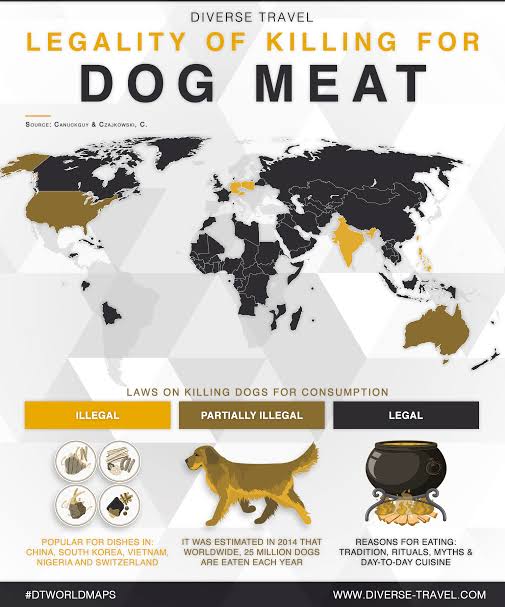Food as a cultural phenomenon: analysis on Westernization from a Constructivist Perspective
Cultural Constructs and Legal Shifts: The Case of Dog Meat Consumption
The consumption of dog meat has been historically common in several countries, mainly in parts of East and Southeast Asia, including China, South Korea, and Vietnam. The practice has deep-rooted historical and cultural significance. In China, it dates back thousands of years. Similarly, in Korea, it has been a part of traditional cuisine for centuries, often associated with medicinal beliefs.
The dog meat market has been surrounded by controversy, especially anbout animal welfare and ethical considerations. In recent years, there’s been a growing movement against the consumption of dog meat, leading to changing attitudes and legal reforms in these countries. South Korea has been considering the ban since 2021.
In a recent BBC article, the debate over dog meat consumption in Asia is presented as not just a legal issue but also a cultural one. From a Constructivist perspective, this situation offers a unique view into how laws can influence and reflect cultural norms.
Food is one of the most essential building blocks of regional and national culture. To get to know an international community, look towards their favorite cuisines and most common ingredients.

Constructivism suggests that our understanding of norms is shaped by social interactions and cultural narratives. The legal discourse against dog meat consumption is part of a broader shift in societal values towards animal rights and ethical treatment. This change is not uniform across all societies at the moment, which reflects the diverse cultural opinions attached to dog meat.
As laws change, they can challenge long-standing cultural practices. However, this process is complex. Changing laws may lead to a shift in cultural norms, but it can also face resistance from those who see these practices as part of their cultural heritage.
This interaction between law and culture shows how societal values are constructed and the role of legal systems in permitting or reshaping these values.
Under Constructivism in International Relations Theory, the movement to change legal norms around dog meat consumption in Asian countries can be perceived as an instance of ‘Westernization’. This perspective argues that global norms, often influenced by Western ideologies, are increasingly shaping local cultures and legal systems.
The shift away from dog meat consumption can be critiqued as a form of cultural imperialism, where Western values regarding animal rights and dietary preferences are imposed on other societies. This viewpoint emphasizes the tension between global normative influences and local cultural practices.
This leads us to consider questions about cultural sovereignty and the homogenization of cultural norms under globalization. This case illustrates the intricate relationship between law, culture, and societal norms. The power of legal frameworks both reflects and reshapes cultural practices.
For a detailed account of the issue, read the BBC article here.
References
- Lee, B. J. M. J. K. A. H. (2024, 9 enero). South Korea passes law banning dog meat trade. BBC News. https://www.bbc.co.uk/news/world-asia-67920167
- The Editors of Encyclopaedia Britannica. (2020, 17 junio). Westernization | Definition & Influence. Encyclopedia Britannica. https://www.britannica.com/topic/Westernization
- ChatGPT. (n.d.). OpenAI. https://chat.openai.com/#









No responses yet